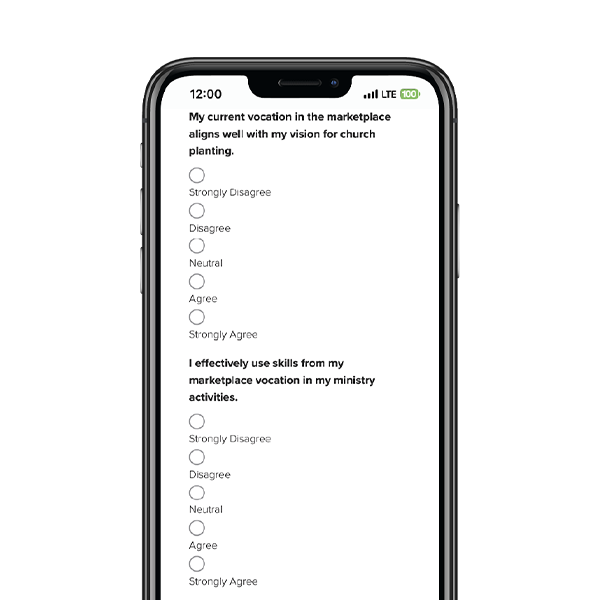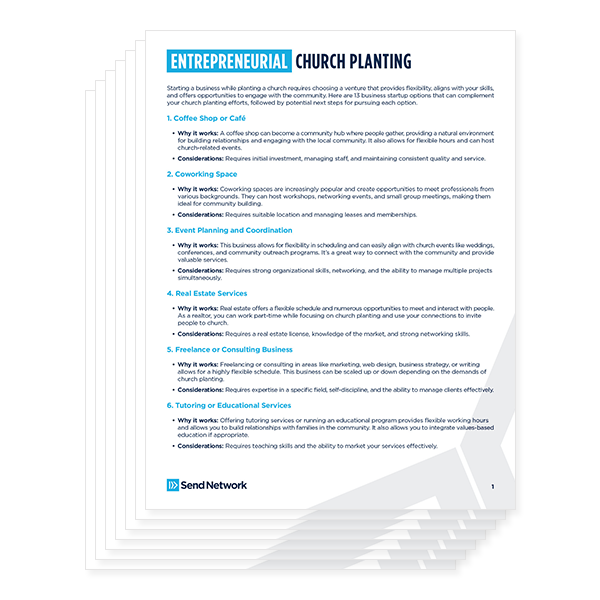Learn more: Take the New Churches Bivocational Ministry course.
Time management is hard. And while it comes easier for some more than others, it remains a significant topic for any church planter — especially covocational planters.
In this article, we’ll follow a simple, yet helpful, way to organize your week based on the common illustration where you fill a jar with big rocks first, then medium-sized rocks and finally let God fill in all the cracks and crevices.
BIG ROCKS: THE “HAVE TOS” AND “GET-TOS”
The more you learn about the orientation of Jesus to the Father, the more you come to realize that God wants us to prioritize an abiding life with Him first and then let our workflow from that.
Most of us work frantically trying to juggle life, hoping God will lead us and bless us. But the truth of Scripture and the teaching of the Sabbath is that God blesses and favors those who make sure they rest and abide first and then let God build influence from their work.
Your physical well-being, mental stability and overall soul care are the deep wells of good news you give to people, so it makes sense you prioritize this side of life.
Consider the following quotes:
“The one who is wise, therefore, will see their life as more like a reservoir than a canal. The canal simultaneously pours out what it receives; the reservoir retains the water till it is filled, then discharges the overflow without loss to itself … Today there are many in the Church who act like canals, the reservoirs are far too rare … They want to pour forth before they have been filled; they are more ready to speak than to listen, impatient to teach what they have not grasped, and full of presumption to govern others while they know not how to govern themselves.” Bernard of Clairvaux
“Hurried leaders are quick to do and slow to be; quick to speak but slow to listen; quick to teach and slow to learn; quick to lead others but slow to let God lead them beside his still waters.” Alan Fadling
Now ask yourself:
- Are you more of a reservoir or a canal?
- Do you find yourself wanting to “pour forth” before being filled up?
- Would you consider yourself a hurried leader?
We must recognize that everything starts with our relationship with our Father. Having time for all the other important aspects of life, ministry and mission has to flow out of our time with Him.
Other big rocks:
- Family time: While your Sabbath time may include this, make sure you also schedule in the family time as a “big rock.” This may involve time watching kids’ athletic and extracurricular school activities, games, plays, etc. Also, schedule in family nights and dates with your spouse.
- Vacation: Even if some of your vacations are “staycations,” there must be extended times scheduled as “big rocks” where you completely unplug from the normal rhythms of work.
MEDIUM ROCKS: “SHOULD-DOS”
Time with leaders: As an equipper, you need to give your best time to your best leaders. If they do well, your entire movement does well.
Time with lost people: Your next time commitment should be with those who do not know Christ.
If church planting is truly about impacting lostness and transforming your community, then, as followers of Jesus, we need to be an advocate for lost people. This means we will spend coffee times, mealtimes, workout times, etc., in pre-conversion discipling relationships.
LITTLE ROCKS: “GOD-GETS-TOS”
Space: Blocking out space or undesignated time is critical for spontaneous ministry to happen. Margin is the space between our load and our limits, between vitality and fatigue. It is the opposite of overload.
Relationships happen in the margins. In other words, if we never block out time for God to spontaneously interrupt us for His purposes, we will miss wonderful opportunities to join Him in what He is already doing.
Church Stuff: The last things are the activities you must do to help the broader movement. That could be a few hours for sermon prep, two hours for staff time, a quarterly leader’s training, etc.
As a covocational leader, you will discover that many gathered church activities don’t take (or shouldn’t take) as much planning time as we have been led to believe.
Learn more: Take the New Churches Bivocational Ministry course.
Editor’s note: This is an excerpt from Covocational Church Planting by Brad Brisco.
Published January 19, 2022




